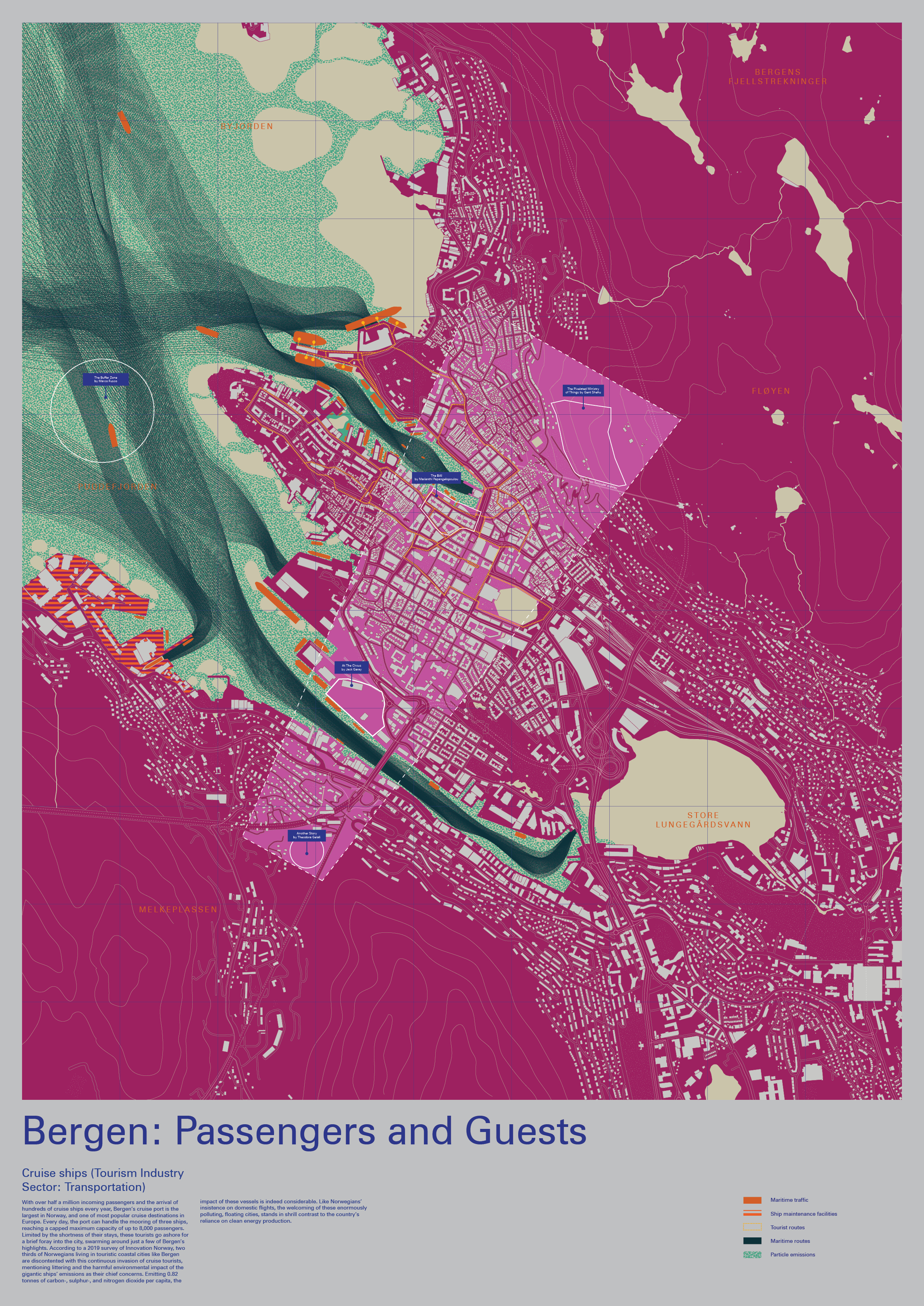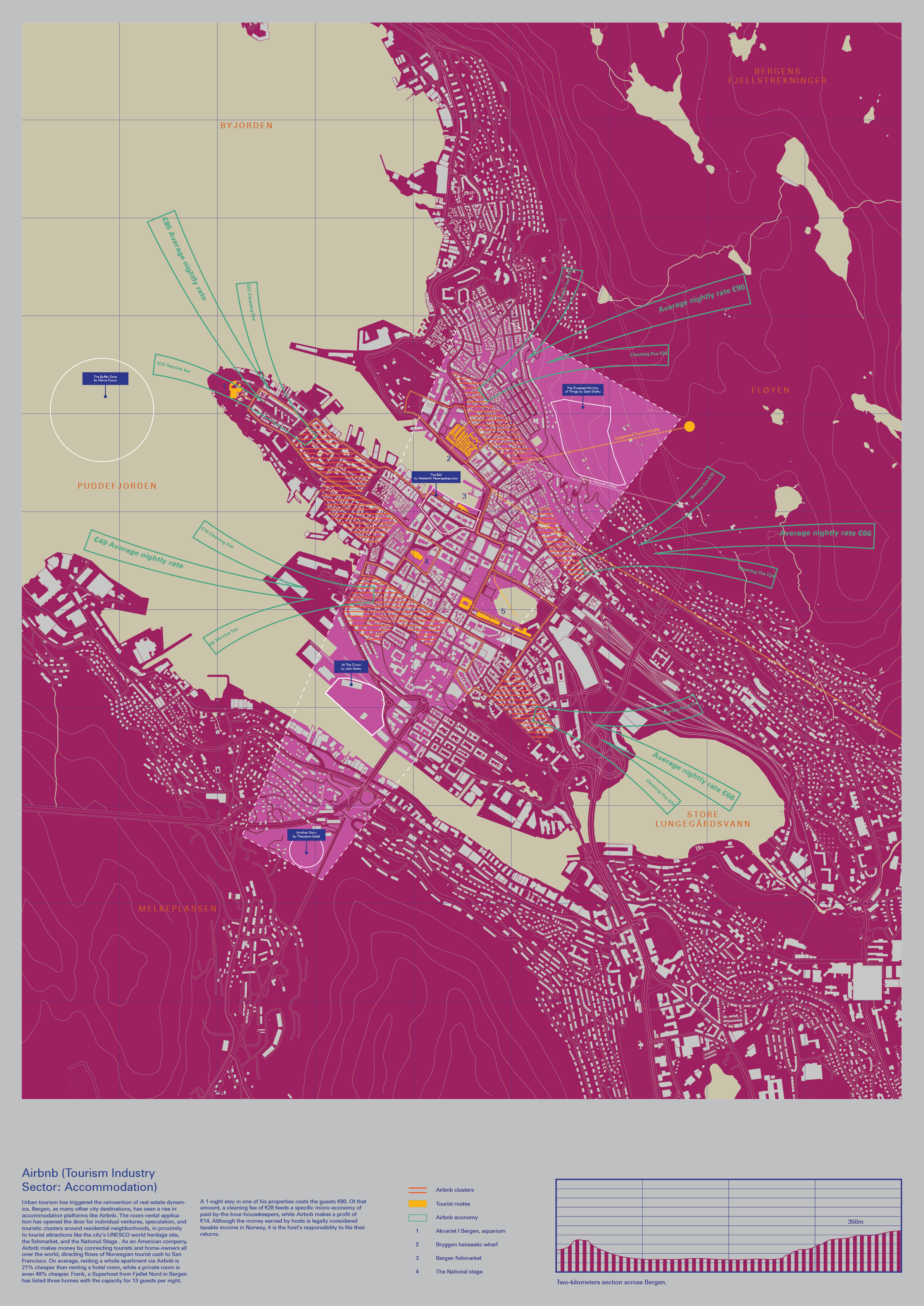

Cruise ships
(Tourism Industry Sector: Transportation)
(Tourism Industry Sector: Transportation)
With over half a million incoming passengers and the arrival of hundreds of cruise ships every year, Bergen’s cruise port is the largest in Norway, and one of most popular cruise destinations in Europe. Every day, the port can handle the mooring of three ships, reaching a capped maximum capacity of up to 8,000 passengers. Limited by the shortness of their stays, these tourists go ashore for a brief foray into the city, swarming around just a few of Bergen’s highlights. According to a 2019 survey of Innovation Norway, two thirds of Norwegians living in touristic coastal cities like Bergen are discontented with this continuous invasion of cruise tourists, mentioning littering and the harmful environmental impact of the gigantic ships’ emissions as their chief concerns. Emitting 0.82 tonnes of carbon-, sulphur-, and nitrogen dioxide per capita, the impact of these vessels is indeed considerable. Like Norwegians’ insistence on domestic flights, the welcoming of these enormously polluting, floating cities, stands in shrill contrast to the country’s reliance on clean energy production.
Airbnb
(Tourism Industry Sector: Accommodation)
Urban tourism has triggered the reinvention of real estate dynamics. Bergen, as many other city destinations, has seen a rise in accommodation platforms like Airbnb. The room-rental application has opened the door for individual ventures, speculation, and touristic clusters around residential neighborhoods, in proximity to tourist attractions like the city’s UNESCO world heritage site, the fishmarket, and the National Stage. As an American company, Airbnb makes money by connecting tourists and home-owners all over the world, directing flows of Norwegian tourist cash to San Francisco. On average, renting a whole apartment via Airbnb is 21% cheaper than renting a hotel room, while a private room is even 49% cheaper. Frank, a Superhost from Fjellet Nord in Bergen has listed three homes with the capacity for 13 guests per night. A 1-night stay in one of his properties costs the guests €90. Of that amount, a cleaning fee of €28 feeds a specific micro-economy of paid-by-the-hour-housekeepers, while Airbnb makes a profit of €14. Although the money earned by hosts is legally considered taxable income in Norway, it is the host’s responsibility to file their returns.
(Tourism Industry Sector: Accommodation)
Urban tourism has triggered the reinvention of real estate dynamics. Bergen, as many other city destinations, has seen a rise in accommodation platforms like Airbnb. The room-rental application has opened the door for individual ventures, speculation, and touristic clusters around residential neighborhoods, in proximity to tourist attractions like the city’s UNESCO world heritage site, the fishmarket, and the National Stage. As an American company, Airbnb makes money by connecting tourists and home-owners all over the world, directing flows of Norwegian tourist cash to San Francisco. On average, renting a whole apartment via Airbnb is 21% cheaper than renting a hotel room, while a private room is even 49% cheaper. Frank, a Superhost from Fjellet Nord in Bergen has listed three homes with the capacity for 13 guests per night. A 1-night stay in one of his properties costs the guests €90. Of that amount, a cleaning fee of €28 feeds a specific micro-economy of paid-by-the-hour-housekeepers, while Airbnb makes a profit of €14. Although the money earned by hosts is legally considered taxable income in Norway, it is the host’s responsibility to file their returns.